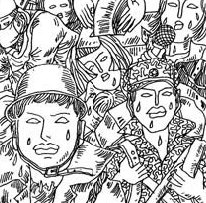
It was amusing to read the reports, mainly filed by the Western media, about the popularity of Wen Jiabao's site on Facebook, an online social network service.
I agree that the Chinese premier has been doing a good job in helping the communities in the earthquake zone in Sichuan. But I have certainly passed the age to log on Facebook with a passage to "Grandpa Wen".
I would argue that Wen has not earned so much honor by just himself. Nor does China's strength lie just with any particular person. The effectiveness of China's post-quake rescue mission, with Wen as the frontline commander, is joined by a massive number of people. Many individuals have acted heroically in their own ways.
Last week I said goodbye to a friend of mine when he was given the approval to go to the Sichuan quake zone after a long wait. He was one of only a few people who got the chance to cover from the epicenter of the Tangshan earthquake of 1976, that killed almost a quarter of a million people.
Now, already approaching 60 with some chronic ailments, the man still wants to file first-hand reports from the disaster zone.
What I would point out here is that in such individual cases, the borderline between one's job contract and moral commitment, and that between professionalism and volunteering spirit, is already blurred.
And of course, there are volunteers, in both the quake zone and support lines all over China. There are givers, who helped the government raise 40 billion yuan in relief money and goods in three weeks. Many do not want to have their names and the amount of their donations reported.
In addition, emergency relocation was arranged for 15 million people.
With all the things to attend to in the process, Sichuan's relief work is a huge challenge. To make it work, it takes not just a resolute central government, and not just the dispatching of the army and rescue teams, but also all people's willingness to give a little more help and to do a little more work on a daily basis.

During his visit to Sichuan's Beichuan Middle School, where the quake claimed many lives, Wen Jiabao wrote on the blackboard for the students "Distresses may help resurrect a nation" (duo nan xing bang). This was a theme repeatedly discussed in China's ancient political writings, the first dating back to Zuo Zhuan, a book of commentary on the events in the Spring and Autumn periods (770-476 BC).
The original meaning of the saying is a definition of leadership. According to it, in times of difficulties, a successful leadership can help people get united and work harder, and in the end help a nation grow stronger.
But leadership is not only attributable to a person in a high position. It is something like Buddhism, in which the Buddha is in everyone's heart and one only has to realize it.
Nor is the classical saying remembered only by the cultural elites. It is part of China's culture, and the same saying and the same idea have been replayed from time to time, by organizations and individuals. People admire those capable of great endurance, with no complaints about difficulties, and no fear of threats.
It is from this tradition that so many have learned how to react to a crisis within the limitation of the time and the situation they may face - like in the cases of the teachers who gave their lives when trying to rescue their students, and the volunteers who biked or walked all the way to the rescue scenes.
The premier just happened to be the person who annotated the nation's shared experience on the blackboard of a school destroyed at the epicenter.
E-mail: younuo@chinadaily.com.cn
(China Daily 06/02/2008 page4)

